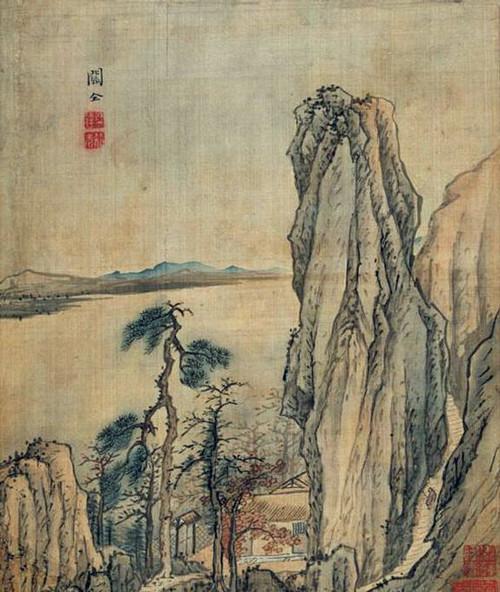In the evening, the grass on the shore of Jinling is flat, the sunset is bright, and the water is merciless. Six generations of prosperity, dark and fleeting waves. There is a Gusu taishang in the air, such as the West Mirror illuminating Jiangcheng.
Nanjing, known as Jinling in ancient times. Historically, the Eastern Wu, Eastern Jin Dynasty, and Southern Dynasties have been fixed here, and posterity has a lot of feelings when they visit. Ouyang Jiong, a famous literary scholar of the early Song Dynasty of the Fifth Dynasty, filled in the poem "Jiang Chengzi", which told the story of sigu humor, and was praised by later generations of literati. He used slightly sad sentences to write about the vicissitudes of the world. After reading the entire first word, I felt a sense of sadness and a hint of loss lingering around me.

Ouyang Jiong was an official in Later Shu in the early days, serving as a Zhongshu Sheren and a Hanlin scholar. After the fall of Later Shu, Ouyang Jiong entered the Northern Song Dynasty as an official and was given the title of Scattered Horseman. His official career was limited, and posterity mostly knew him because he had written a preface to the Hanama Collection, and he was a representative lyricist of the Hanama school.
Experiencing the pain of the fall of the country and visiting the ancient capital of the former dynasty, Ouyang Jiong couldn't help but have mixed feelings. The bustling scenery is not enough to see, but he looks at the desolation. In the evening, the sunset shines on the head of Jinling City, and the wild grass outside the city extends to the riverside. The sunset illuminated the sky, and the river rushed. The river headed eastward, paying no attention to the beauty of the sky. What a ruthless river, even if you see the prosperous land of the Six Dynasties, you don't have any nostalgia. The past years of Jinling City passed away with the gushing river.
Ouyang Jiong thought about the past of Wu Yue's struggle for hegemony during the Spring and Autumn Period. King Wu built a high platform on Mount Gusu, and the Yue King presented the beauty Xi Shi to stay in the Guanwa Palace. Thousands of years have passed, and Gusutai has become a relic, and only the bright moon hangs high. Perhaps Jinling City is also like Gusutai, witnessing the rise and fall of dynasties. The bright moon in the sky, round and bright like Xi Shi's dressing mirror, silently illuminated Jinling City. Even if time flies, only the bright moon has not changed.
After reading the entire first word, I found that Ouyang Jiong still had hatred in his heart. He hated the rulers for stealing their lives and indulging in wine-colored singing and dancing. He used the story of King Wu's defeat to allude to the fainting of the rulers of Later Shu. Even if he entered the Northern Song Dynasty, he could not calmly talk about the pain of the subjugation of the country.
Originally a humorous word, after incorporating historical allusions, it immediately took on a style. From the rise and fall of the Six Dynasties, I think of Wu Yue's struggle for hegemony, and then tell the hatred in my heart. The whole process is as comfortable and smooth as the clouds and the flow of water, and many literati are afraid of being contaminated with right and wrong, and will not openly talk about the experience of national subjugation. Ouyang Jiong was angry, and he couldn't see that he was afraid. He borrowed historical stories, opened his heart, and expressed them directly. Such bright and honest literati are not very common.
He likened the bright moon to a "west mirror", which has the momentum of looking at the long river of history. Such a clever composition, I really don't know how he came up with it.